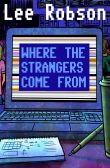A little while ago, I stumbled across a link to The Bee, an online magazine for working class writers, backed up by New Writing North. Reading through some of the articles, it helped me get a grip on something that's been tickling the back of my mind for a long time, about how the work of working class creatives is treat differently from those of other class backgrounds.
When I saw the open submissions call, I jumped at the chance to write something, solidify my feelings on it all, and point out that working class creatives have to continually force themselves into very narrow boxes for their work to be deemed 'worthy.'
Which my pitch wasn't.
So, because it's just going to languish in the archives unseen otherwise, here's the full article, written but never given the chance to be submitted:
+++
JUST AN IDEA
Lee Robson
I have a tendency to play down my background when it comes to my work.
It’s not because I’m ashamed of my past or where I come from, it’s because I usually find myself being shoehorned into a specific box when people discover I grew up on a council estate, raised by my mam. Suddenly, my work doesn’t matter; the words I’ve put down on the page are irrelevant and I’m seen differently. Why am I writing horror stories or pulpy spy adventure comics? Why am I not writing My Truth? Why am I not pouring my heart and soul about my obviously awful, awful upbringing onto the page? Why am I not letting the world know about the never ending horror of living in a *gasp* council house?
The simple answer is that I don’t want to. Just because I’m working class doesn’t mean that’s all I am or all I want to write about, as much as people would like me to.
And I think that’s a larger problem for working class creatives of all stripes.
Let’s be honest: the view of what a working class person in the UK hasn’t really changed over the decades. We’re generally seen as homogenous, usually white, all sharing the same opinions handed down to us from The Sun, who should know their place in society is to be simply looked down on by our “betters” and do as we’re told. When someone dares have the temerity to break away from that view, to do something different, to create something, well, that’s when the fun starts: to have the work accepted and deemed “worthy,” it has to be palatable to the middle classes, and that means everything has to fit with the strict confines of what they expect. You’re a poet? Your work has to be about life in a council estate. You’ve written songs? Sorry, but they have to be about how tough life’s been for you getting to where you are. You’ve written a screenplay? Only interested if it’s a gritty, urban drama about people living on benefits.
Because everything has to be palatable to that very narrow audience, the rough edges get smoothed off, uncomfortable truths and ideas get ironed out, and cliches are used instead of actual people, places and events. Take the very website you’re reading this on, for example (and, yes, I’m aware that I’m about to bite the hand that is potentially going to feed me if this ever gets published - [spoilers: it didn't!]): it’s aim is to promote working class writing, but it’s audience is the middle class, so everything gets flattened out into safe, acceptable voices that reinforce that idea of the working class homogeny. And, yes, I’m aware that I’m writing this piece in such a way that will appeal to that audience. Heaven forbid that the middle classes ever encounter the actual, unpolished views of a working class person, with all their subtlety and nuance intact! It might make them think we’re actually...people...
Let’s be honest here: the desire for “authenticity” in creative works is never about the work or the person behind it, it’s about the idea of it. Because of that, the view of what’s deemed “acceptable” or “worthy” becomes incredibly narrow, and keeps people boxed into a specific lane, which, in turn robs the wider world of new voices and perspectives in a variety of spaces. Working class creatives – or POC creatives or LGBTQ+ creatives, for that matter – are only “allowed” to create works around that one aspect of who we are to be supported or just seen.
That’s not to say we don’t need those voices in creative spaces: we absolutely do. Those voices need to be heard, but there has to be room for creatives to be themselves, and not just who they’re expected to be. There has to be a place for the working class screenwriter who wants to do creeping folk horror rather than, say, a half hour comedy based on their experiences growing up in a council house, or the working class artist who wants to draw comics full of spaceships and aliens rather than a hard hitting illustrated story about life on the dole. In a perfect world, that support system would be there, and we’d have a much wider range of voices bringing something unique to the world across a broad spectrum of creative endeavours, but – as you may have noticed – we don’t live in a perfect world.
Is there a way to fix this? I honestly don’t think there is. The class system is baked into the DNA of the entire country, so we’re stuck with what we have, and no amount of complaining or Arts Council funding or new bodies being set up will change it. The only support for working class creatives is so narrowly focused you either have to play the game and become the idea of who you’re supposed to be in the eyes of the middle class audience you’re meant to be aiming at or try and forge your own path, and, maybe, watch your work sink without trace. Neither option is ideal, and they both lead to potentially losing out on new voices and new perspectives.
Of course, all of that is just the opinion of one person you’ve never heard of (and probably won’t read any more of, let’s be honest), based on his own personal adventures. Other people’s forays into the creatives space may be wildly different. We are, after all, individuals, with our own views, shaped by our own experiences.
We’re not just an idea of who we’re supposed to be.













